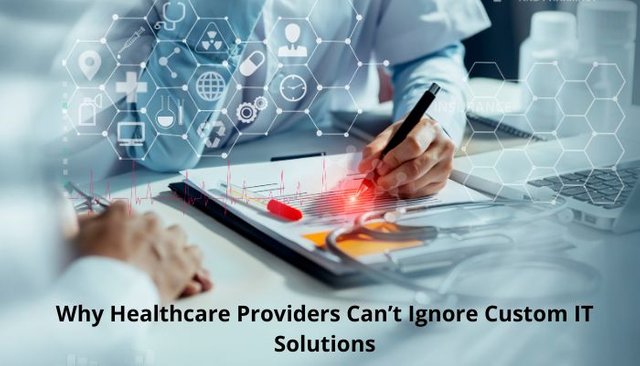Why Healthcare Providers Can’t Ignore Custom IT Solutions
Every industry has been experiencing transformative change over the past few years, and the healthcare industry is no exception. Industries are moving towards digital integration to improve operational efficiency and patient outcomes. Legacy systems and traditional approaches no longer suffice in a world where both patient expectations and medical challenges are evolving. Thus, getting custom healthcare IT solutions can fulfill the critical demand of healthcare providers, allowing them to adapt to modern demands while focusing on the needs of the patients and institutions.
If still not sure whether to consider custom IT solutions or not, we have mentioned some of the compelling reasons that can help you make the decision.
Reasons Why Hospitals Cannot Ignore IT Solutions
Many industries can have one-size-fits-all solutions, but healthcare complexity calls for customized approaches. Different healthcare centres, from multi-speciality hospitals to specialized clinics, have unique workflows, patient demographics, and regulatory requirements. Let’s have a look at some of the top reasons why you cannot ignore IT solutions for your healthcare department.
Meeting Needs with Custom Solutions
Having custom solutions can provide organizations with different functionality, from patient management tools to custom EHR( Electronic Health Records).
A. EHR and EMR Customization
To fulfill the exact needs of the healthcare providers, they often require Electronic health records and electronic medical records. With the help of the custom EHR solution, the businesses can prioritize the specific data fields, integrate local regulatory compliance, and also customize interfaces to make the technology more intuitive for their staff.
B. Integration with Existing Systems
Most of the healthcare providers have their traditional or can say legacy systems that need to be updated with the help of the new systems, but the data can be lost, so when going for custom solutions can merge these disparate systems, making a single source of truth for patient data and streamlining administrative processes.
Patient Centric Care Needs
Patients want individualized and easily available healthcare in the digital age. Custom solutions give organizations the means to meet this requirement for personalization by assisting them in creating mobile applications, telemedicine systems, and patient portals that meet patient standards.
A. Telemedicine and Remote Care
Custom telemedicine platforms, which prioritize accessibility, provide remote monitoring, consultations, and diagnostics that are customized to meet the unique needs of a hospital or clinic. This improves chronic illness management and follow-up in addition to expanding patient access to care, particularly for patients in underserved or remote locations.
B. Patient Engagement Tools
Patients can directly access their medical histories, treatment plans, and appointments through personalized health portals. Features like symptom checks, personalized wellness plans, and direct chat with medical professionals are just a few examples of what custom-built portals may offer to improve patient engagement and promote better health outcomes.
Improving Data Security and Compliance
There is multiple data present in the healthcare centres that can be crucial and very sensitive, making security and regulatory compliance top priorities. Thus, a healthcare software development company can provide you with the custom solutions that can match the standard of security you require for your systems.
A. HIPAA and GDPR Compliance
If you go for the custom solutions for your healthcare project, then you can get the regulations like HIPAA and GDPR as per the requirements of the project. These requirements are covered in this custom solution and reduce the risk of breaches and legal issues.
B. Advanced Security Protocols
With the custom solutions, healthcare providers can include better and advanced security measures that include multi-factor authentication, data encryption, and secure patient access portals, and keep the sensitive information of the patient protected.
Facilitating Collaborative Care and Interoperability
As the healthcare sector gets a custom solution, they can get the cross-departmental integration in their system, which can improve the manual work by decreasing the challenge of the availability or delays of important documents to another healthcare provider or even across departments.
A. Cross-Departmental Integration
With the custom development, the businesses can enable smooth data sharing and communication between the departments. This integration supports coordinated care, such as smooth transitions from primary care to specialized care.
B. Inter-Provider Collaboration
With the custom solution, the system can establish data-sharing protocols with other facilities and specialists. This facilitates better continuity of care, as patient data follows them from one provider to another, and each team member has a full view of the patient's history.
Adapting to Emerging Healthcare Technologies
Custom solutions include the latest technologies integration in the system as per the requirements of the project, like AI, ML, and Internet of Things devices. These solutions help healthcare institutions keep pace with these advancements by offering flexibility and adaptability that off-the-shelf solutions often lack.
A. AI and Machine Learning Integration
With the custom healthcare software, the AI and ML technologies can also be integrated as per the needs of the client. The integration can result in better image recognition in radiology, AI- AI-assisted diagnostics, or machine learning algorithms to predict the patient's condition in critical care units.
B. IoT for Patient Monitoring
The integration of the IoT devices in the healthcare systems is helping the better patient monitoring from the inside and remote care. Thus, the custom solutions can cover this and can help the healthcare businesses to have the power of IoT in their internal system.
Conclusion
Coming to the end, hope you understood why one should choose a healthcare IT solution for their businesses. To cope with the modern challenges, there are multiple things that should be taken care of by including the latest technology, which can have a direct impact on patient care, data security, and enhanced operations. Still confused, consult experienced experts to get a better understanding.
